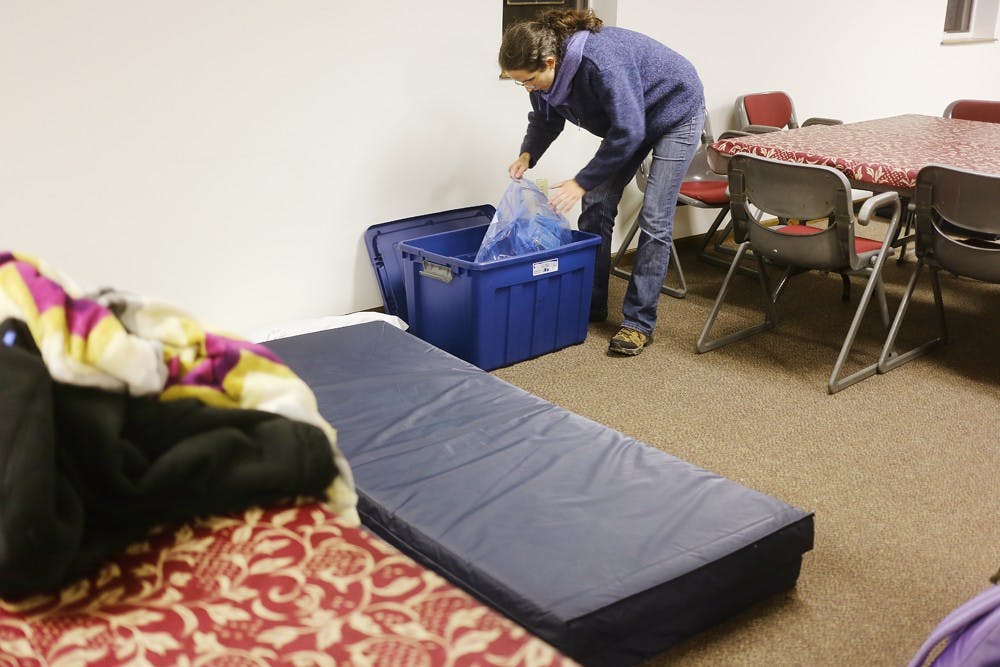Community members fight for the homeless

As the cold temperatures of winter loom, community programs begin efforts to assist homeless people in Mount Pleasant and Isabella County.
The Isabella County Restoration House is a collaborative community effort now in its second year. The ICRH was open for 12 weeks last year, but starting this week will serve the community until March 28.
Its purpose is to address the need of those without consistent housing in Isabella County.
According to the U.S. Census Bureau, the home ownership rate in Isabella Country from 2008-12 is 58.9 percent, compared to 72.8 percent in Michigan. The county has 32 percent of its residents living below the poverty level, about double the state rate. Even those who have homes are worse off. The median household income is $13,000 less than the rest of the state, at $35,927.
"After looking at different possibilities of how to help members of our community that had no place to stay in the winter, the most logical option was the rotating shelter, which is the model that we went with," said Julia Keepper, a member of the ICRH Board and co-chair of the Rotating Shelter Committee..
The site of the shelter changes each week among churches willing to open their doors and provide volunteers.
"What we do is provide the bedding, mattresses, supplies and training on policies and procedures," Keepper said.
Every day at 4:30 p.m., guests check in at the intake center at the Unitarian Universalist Fellowship, on 319 S. University Ave.
From there, they are moved to the host site by the Isabella County Transportation Commission's iRide service and Chippewa Cab and Limo.
In the morning, guests are taken to the Isabella County Soup Kitchen, 620 S. Adams St.
"We anticipate more volume this year we think just based on the phone calls and the questions that we've got already wondering when we're opening," Kepper said. "We are hoping to fill that need for emergency shelter at this point."
The Isabella County Soup Kitchen has served the Mount Pleasant community since 1990.
The soup kitchen offers a self-serve continental breakfast from 8-10 a.m. and lunch from 11:30 a.m.-1 p.m. Monday through Saturday.
Director Kim Friedrich said they average about 100 lunches a day.
Those in need services are a diverse group of people and not just the unemployed, but the underemployed as well.
"We serve people from all walks of life," she said. "We have an open door policy. We don't ask questions of our guests that come in."
She said the kitchen is always looking for volunteers to commit their time or money to the cause.
Brad Vavzincak has been involved with the Runaway Homeless Youth Program through Listening Ear for the past eight years. He worked as a case manager assisting struggling youth in finding stable housing.
"The whole focus of the program is to try to reunify them back with parents, family members, and to provide some sort of stabilized living environment," he said.
Vavzincak said RHYP also assists with clothing needs, transportation and keeping kids in school.
"Last year we had about on average nine people a week," said Morgan Smart, intake coordinator with the ICRH. "I'm figuring about the same thing happens (this year). It takes a while for word to spread that we're open again."
Joyce Henricks is a retired professor in the philosophy department at Central Michigan University and a second-year member of the ICRH board.
"At first I didn't even realize there were homeless people in Mount Pleasant," she said.
Henricks said after a guest speaker came to the university, her eyes were opened and she became aware of just how large the problem is.
"I think the thing that shocked me the most is that all of the stereotypes about who the homeless are are just false," she said. "They're not alcoholics. They're not drug people."



